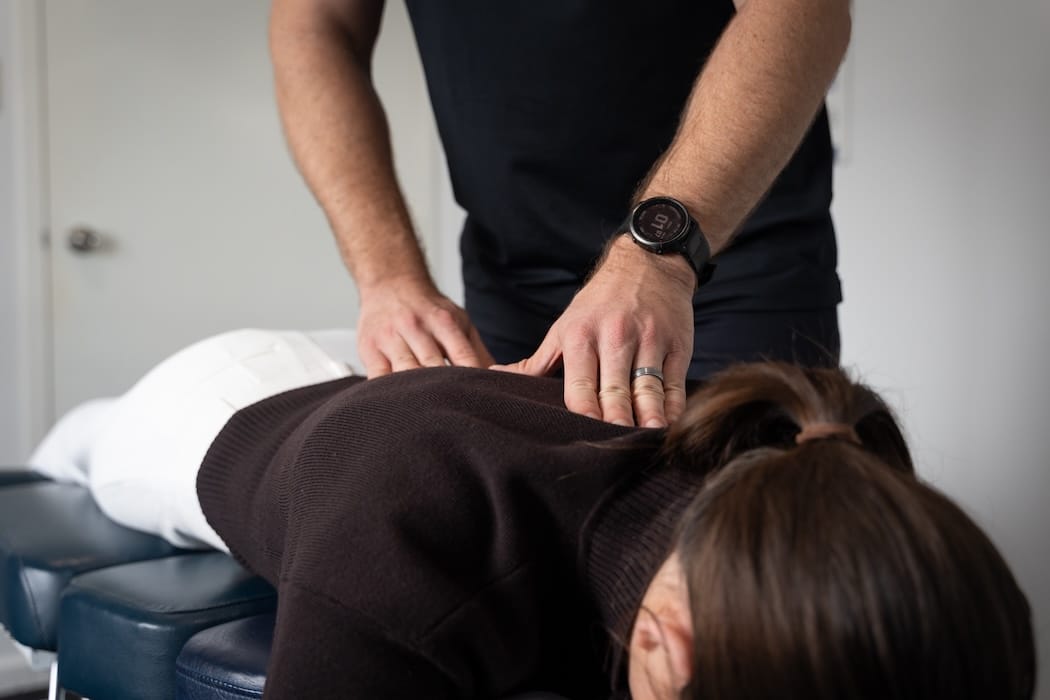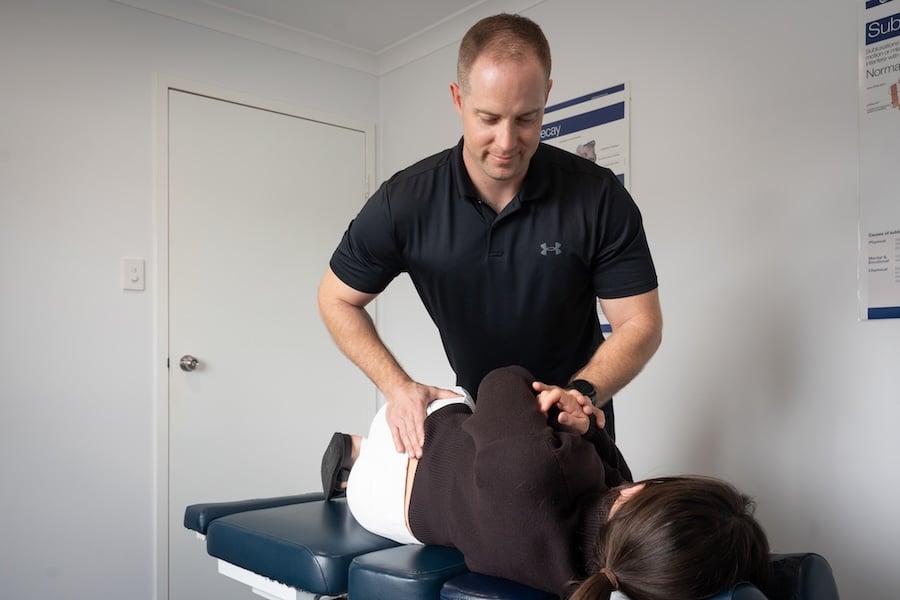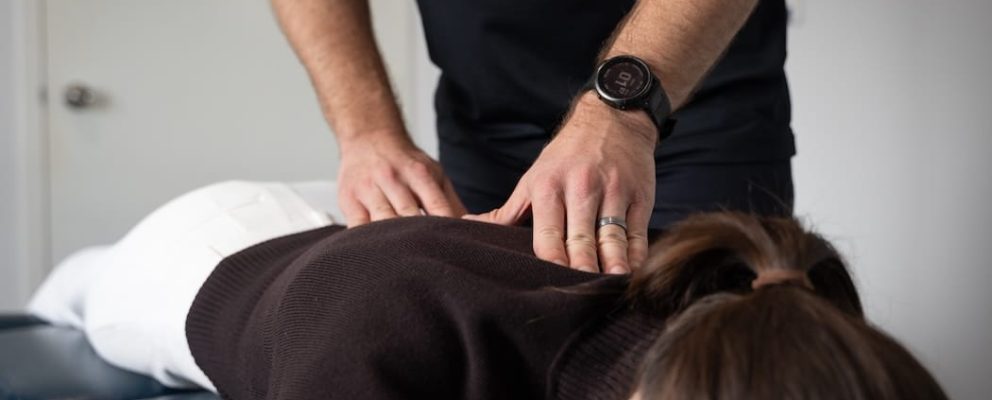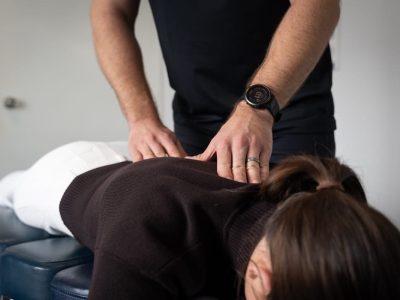Understanding a Pinched Nerve in the Hip
A pinched nerve in the hip occurs when surrounding muscles, tendons, or joint structures place pressure on a nerve. This compression can cause sharp or radiating pain through the hip, buttock, or down the leg, often mistaken for sciatica.
Common causes include prolonged sitting, poor posture, muscle tightness, or spinal conditions such as a herniated disc. Identifying the source of irritation is the first step to finding lasting relief through appropriate chiropractic care and targeted movement strategies.
Quick Summary
| Category | Details |
|---|---|
| Common Symptoms | Sharp or burning pain in the hip or buttock, tingling or numbness down the leg, weakness in the hip or thigh, and pain that worsens when sitting. |
| Typical Causes | Prolonged sitting, poor posture, tight muscles, herniated disc, or spinal misalignment compressing nearby nerves. |
| Treatment Options | Chiropractic adjustments, dry needling, gentle massage, stretching and strengthening exercises, and posture correction. |
| Exercises That Help | Knee-to-chest stretch, piriformis stretch, hip flexor stretch, and cat-cow spinal mobility movements. |
| Recovery Timeline | Mild cases: 1–2 weeks. Moderate cases: 4–6 weeks. Severe or chronic: up to several months depending on treatment consistency. |
| When to See a Chiropractor | Persistent pain lasting more than a few days, weakness or numbness, or recurring discomfort that limits daily movement. Book an appointment online for assessment. |
Common Symptoms
A pinched nerve can produce a range of sensations depending on which nerve is affected. Typical symptoms include:
- Sharp, shooting or burning pain in the hip or buttock
- Numbness or tingling radiating into the leg
- Muscle weakness in the hip or thigh
- Pain that worsens when sitting or bending forward
- Relief when standing, walking, or changing position
If symptoms persist beyond a few days or affect your mobility, professional assessment is recommended to rule out conditions such as sciatica or joint dysfunction.

How Long Does a Pinched Nerve Last?
Recovery time depends on the severity of compression and how early treatment begins.
- Mild cases may resolve within a few days to a week with rest and gentle mobility work.
- Moderate cases often improve within 4–6 weeks with guided chiropractic adjustments, soft tissue therapy, and corrective exercises.
- Severe or chronic cases may require several months of care to fully restore nerve function and mobility.
Addressing the root cause early can prevent recurring flare-ups and speed up recovery.
Treatment and Relief Options
The goal of treatment is to reduce pressure on the affected nerve, relieve inflammation, and restore movement. At Regenerate Chiropractic, we use evidence-based methods tailored to your specific presentation, which may include:
1. Chiropractic Adjustments
Precise adjustments help improve joint motion and reduce nerve irritation from spinal or pelvic misalignment. Learn more about our chiropractic approach.
2. Dry Needling
Dry needling targets tight or overactive muscles that may be compressing the nerve. This helps reduce tension and improve circulation. Discover more about dry needling therapy.
3. Soft Tissue and Massage Therapy
Gentle massage can help ease muscle tightness and improve blood flow around the affected area. However, deep or aggressive massage should be avoided until inflammation subsides. If you’re wondering “can a massage help a pinched nerve?”, the answer is yes—when performed as part of a structured care plan.
4. Stretching and Mobility Exercises
Targeted stretching helps relieve muscle tension and improve flexibility through the hips and lower back. Consistent movement is key to preventing stiffness and future nerve compression.

Stretching and Exercises for a Pinched Nerve
If your symptoms are mild, gentle stretching and movement can provide relief. Always move within a comfortable range and stop if pain increases.
Recommended exercises include:
- Knee-to-chest stretch – relaxes the lower back and glutes
- Piriformis stretch – reduces pressure on the sciatic nerve
- Cat-cow movement – mobilises the spine and relieves stiffness
- Hip flexor stretch – lengthens tight front-hip muscles that pull on the pelvis
For more tailored guidance, visit our lower back pain page or book a one-on-one session with our chiropractor for exercise demonstration and progression.
When to Seek Professional Help
If your pain is severe, persistent, or accompanied by weakness or numbness, it’s time to book a chiropractic assessment. Early intervention can help prevent long-term nerve irritation and muscle compensation.
We offer affordable chiropractic pricing and personalised care plans to help you recover safely and effectively.
You can book an appointment online or meet our team to learn how we can help you move without pain again.
Recovery Tips at Home
- Apply ice or heat as directed to manage inflammation
- Avoid sitting for long periods—stand or stretch regularly
- Stay active with gentle walking or low-impact exercise
- Maintain hydration and good posture
- Follow your chiropractor’s prescribed home care plan
Find Relief Through Expert Chiropractor Treatment
A pinched nerve in the hip can be painful and frustrating, but with the right combination of professional treatment, movement, and lifestyle adjustments, most people recover fully.
If your symptoms haven’t improved within a week, or you’re unsure whether it’s a nerve issue or muscle strain, schedule a consultation to get a clear diagnosis and a care plan designed around you.
s, luctus nec ullamcorper mattis, pulvinar dapibus leo.






